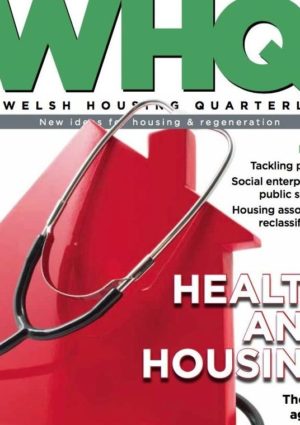Issue 104: October 2016

Editing a quarterly magazine can sometimes leave you at the mercy of rapidly changing news. However, even allowing for what can change in the space of three months, it feels like everything has been turned upside down in the last cycle of WHQ.
Cast your mind back to early June and the UK was safely part of the European Union, David Cameron was prime minister and housing associations were part of the private sector. There were even some people who claimed that England were better than Wales at football.
This October issue tries to make sense of some of those huge changes. Victoria Winckler and Duncan Forbes look to a post-Brexit future for Wales and what life outside the EU might mean for housing and regeneration. We also cover some of the changes made under Theresa May’s new Tory regime and analyse the implications of reclassification of associations by the ONS and options for deregulation.
But the more some things change the more others stay the same. For decades, it seems, we’ve been asking how health and housing (and social care) can work more effectively together. They have of course always been closely linked. Concerns about public health were a major reason for the rise of council housing. Aneurin Bevan was minister for both in the 1945 Labour government, setting out his plans for his ‘living tapestry of mixed communities’ in the time he had spare from founding the NHS.
This issue covers looks at what’s happening now and what might happen in future in health and housing. Our special feature is introduced by Andrew Goodall, chief executive of NHS Wales, and includes examples from across Wales of joint working between the different sectors to deliver more effective outcomes for all.
Also on the WHQ agenda are regeneration in the Vale of Glamorgan, the role of housing agencies in tackling poverty, sharing in social housing and the role that social enterprises could play in the transformation of public services.
And, back with Europe, we feature two projects that would not have got off the ground without EU funding: an update on building Welsh homes from Welsh timber and the Welsh end of a European project to protect homeless mobile citizens.
All that plus our regular features make this a packed and varied issue of WHQ. We’ll be back in January but don’t forget you can keep in touch with what’s happening in the next three months at whq.org.uk.
Jules Birch
Editor, WHQ

This issue of WHQ is kindly sponsored by Melin Homes
-
Board diary – free your mind
Read more » -
A problem shared
Read more » -
Responding to poverty
Members only Read more » -
Place and people
Read more » -
Homegrown homes
Members only Read more » -
Health and housing – Bridging the gap
Read more » -
Health and housing – Living at risk
Members only Read more » -
Melin Homes sponsorship: Zest for life
Read more » -
Health and housing – Making them hapi
Read more » -
Health and housing – Reducing the risks
Members only Read more » -
Health and housing – An army of thinking practitioners
Read more » -
Mapping health and housing
Members only Read more » -
What does Brexit mean for regeneration?
Read more » -
Wales after Brexit
Members only Read more » -
Regulation update – Nine months in
Members only Read more » -
Shelter Cymru sponsorship: Letting go
Read more » -
CIH Cymru sponsorship: The housing hustle
Read more » -
Tai Pawb – Housing generations
Members only Read more » -
Research update
Members only Read more » -
Welsh Tenants: Striking a fair balance
Read more » -
A digital journey into European Homelessness
Read more » -
Cymorth Cymru: The lookout sector
Members only Read more » -
Altair sponsorship: Do you know what you don’t know?
Read more » -
Cymraeg
Iechyd a Thai: Gweithio gyda’n gilydd
Read more » -
Health and housing: working together
Read more » -
Cymraeg
Diweddariad polisi
Read more » -
Policy update
Read more » -
Cymraeg
Golygyddol
Read more »